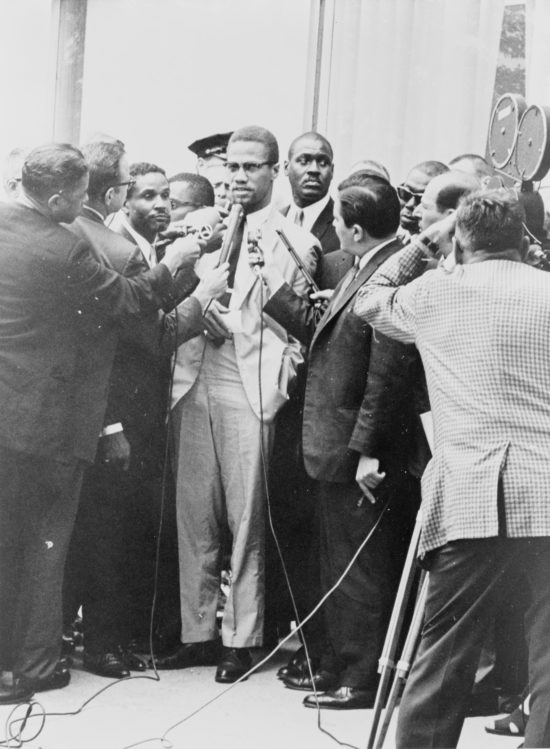
54 Years ago today, on the 21st of February in 1965, one of the most important representatives of the US-American Civil Rights Movement Malcolm X was shot dead during a public appearance in New York. In order to honor this controversial and often misrepresented political activist, we considered it essential to take a look at his life, political views, and achievements.
But if someone puts his hand on you, send him to the cemetery.“
Childhood and youth
Malcolm X was one of the most influential figures in the Black emancipation movement of the 1950s and 60s in the US. Born as Malcolm Little in 1925 in Omaha, Nebraska, X grew up in a politically committed family. His father Earl Little, a Baptist preacher, and his mother Louise Helen Norton Little had already campaigned for Black rights with the Universal Negro Improvement Association (UNIA). When Earl Little was killed in an unsolved traffic accident in 1931, the family was convinced that the accident was
Rise in the Nation of Islam

After being fostered by a family near Detroit for several years, Malcolm Little moved to Boston as a teenager, where he entered criminal milieus and was eventually sentenced to ten years in prison for crimes such as drug trafficking and burglaries. He used his time in prison for intensive self-directed study, especially in history and philosophy. Furthermore, he came into contact with the Nation of Islam, which he joined in 1948. The Nation of Islam was a religious community that aimed at increasing Black US-Americans‘ self-esteem and that propagated the superiority of Black people in the light of the injustices committed by white US-Americans and the system that allowed for these injustices to exist. Having learned a lot about the suffering of his ancestors and fellow Black US-Americans of the time, Malcolm Little refused to further use his original last name in prison as he saw in it the legacy of slavery and the slave owner that gave his ancestors this last name. After being released from prison in 1952, he became a close confidant of NOI leader Elijah Muhammad, who gave him his new last name „X“ in remembrance of the African names taken from Black US-American’s enslaved ancestors. Malcolm Little thus became Malcolm X. When he was asked whether he hated all white people, Malcolm X answered the following, which shows how he holds responsible each and every white individual that profited from the injustices that reigned the country and aggravated the living conditions of the Black population:
Malcolm X quickly rose in the Nation of Islam. He was appointed
Differences in the approaches of Malcolm X and Martin Luther King, Jr.

Although the Nation of Islam is considered an important part of the Black emancipation movement, its approach was quite different from that of the Civil Rights activists surrounding Martin Luther King. The NOI did not seek integration into the white society, but secluded emancipation based on racial separatism. Unlike Martin Luther King, Malcolm X was also not an advocate of fundamental nonviolence. In his famous speech „The Ballot or the Bullet“, that he delivered in Cleveland, Ohio, a few months before the presidential election in 1964, he advised Black US-Americans to exercise their right to vote, while at the same time cautioning them to not trust the politicians and encouraging them to take up arms if the new President did not enable full legal equality for all African Americans. Here is an audio version of the speech with English subtitles and further annotations that explain the context and references that are made:
Disagreement with the NOI
In the early 1960s, the relationship between Malcolm X and the leader of the Nation of Islam worsened. Elijah Muhammad was displeased that X became increasingly prominent in public. Malcolm X, in turn, distanced himself from his spiritual and political foster father, whom he accused of extramarital affairs with minors. In 1964, Malcolm X was expelled from NOI.
Shortly thereafter, Malcolm X made his pilgrimage to Mecca in Saudi Arabia, where he converted to Sunni Islam and once more renounced the religious teachings of Elijah Muhammad. In 1964, he founded the Organization of African-American Unity (OAAU), with which he pursued a more international focus while also seeking rapprochement to Martin Luther King and adopting more moderate positions with regard to seclusion from white US-Americans. In the same year, he also traveled to several African countries and met numerous country leaders, such as Ahmed Ben Bella, first president of Algeria after the independence of the country, Kwame Nkrumah, revolutionary and first president of Ghana, and Gamal Abdel Nasser Hussein, second president of Egypt, as well as gave interviews and appeared on television and radio. He moreover flew to France and Britain, where he once more spoke up against the unjust political and social situation of the US and joined many debates. After his international travels, X more vehemently emphasized the importance of adding a global component to the civil rights issues of the US, as he saw a direct connection between the struggles of all Black people in the whole world.
The Nation of Islam felt betrayed by Malcolm X, and several leaders publicly threatened him with death. On 14 February 1965, members of the movement committed an arson attack on Malcolm X’s house, which he and his family barely escaped. Nevertheless, he continued to appear in public and speak in front of large audiences. Just a week later, Malcolm X was shot dead during a speech by members of the Nation of Islam.
Malcolm X’s legacy
Soon after the assassination of Malcolm X in 1965, the OOAU lost significance. However, the ideas of the activist were adopted by other organizations and activists such as the Black Panther Party, which was founded in 1966. Not least because of the biographical film by director Spike Lee (1992), Malcolm X is still present in the US-American public. His biography, written in collaboration with author Alex Haley and published posthumously in 1965, sold more than six million copies worldwide by 1977. Malcolm X substantially contributed to the



